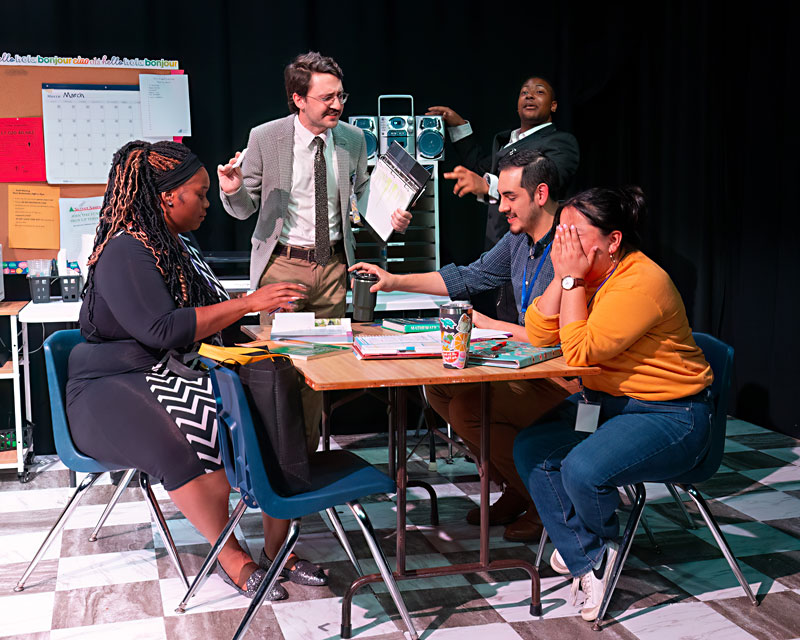Theatre Review: Exit Strategy
Or, how one scrappy school strives for salvation
Reviewed by Cat McCarrey, Fri., July 5, 2024

There’s a controversial saying about teachers: “A good teacher is like a candle – they consume themselves to light the way for others.” In Exit Strategy, a gaggle of Chicago educators illuminate the stages of that saying. Some teachers have utterly burned themselves out, are worn-out wicks in a puddle of wax. Some have the slightest spark left, wavering but present. And some are fresh and uncertain, seeking for a lighter. Now, I myself am a recovering teacher. I spent more than a decade in middle schools, testing the strength of my own candlelight. I left my public school career with the same thought as when I left this play: “Is it worth it?” How powerful is a single school, a single building, a single teacher? Are those questions spurred by my own jaded outlook, or is the play itself asking whether the pain is worth the lack of payoff?
Playwright Ike Holter’s script, which does contain constant strong language (no one swears or parties quite like teachers) and references to suicide, seems straightforward. Tumbldn High School receives notice that this year will be its last. It will be demolished next June. Students and staff get the news in August, and the specter of closing haunts their year. Milquetoast Vice Principal Ricky (Payton Trahan) delivers the news and tries to justify the city’s process. He fields reactions with a quavering mustache and trembling hands, as teachers mock his inexperience while challenging him to do more for the school. The teachers themselves wrestle with their reactions, some resigned, some bitter, some barely hopeful. And some students, like senior Donnie (Edwin Lucas Anderson), still have fight left in them.
Beyond August Productions’ presentation shines in the school setting. Technical director Robyn Conner crafts every set and costume detail to public school perfection. The lounge couch with stuffing tufting out the sides, the abundance of reusable shopping bags wrestled by educators, the hoarded mugs and spattered microwave. I know them all too well. I also adored the bulletin board, with a giant calendar scrawled with announcements and torn to show the passage of time over the course of the play. But this is a play about the people in the school, and I cannot stress this enough – the educator characters are real.
There’s the rock of any building, the veteran teachers. English teacher Pam (Jennifer Gonzalez), who has taught there for 23 years and verbally reams Vice Principal Ricky in the first scene of the play, presents an intense portrayal of the weariness and rage that comes from fighting a system for decades. Her partner in longevity, social studies teacher Arnold (Darren Scharf), is just as tired, but more resigned. His is a quiet anger, resolved but no less potent. Scharf has the optimal teacher slouch of authority. His glasses magically perch somewhere between his eyebrows and hairline, and between that and a singularly unimpressed stare, his “over-this-shit” stance is laser focused.
Rounding out the younger colleagues are Ismael Soto III, Adriana Boyd-Lewis, and Madison Palomo, respectively showing the “cool” teacher who’s corny but still enthusiastic, the bubbly one who imagines all students love her (and bribes them with treats for that privilege), and the perpetually exhausted special education teacher. They squabble over the school’s closure, quibbling over what should and shouldn’t happen. Their discussions about student slang and whose job is harder are eerily familiar. I’ve absolutely had every one of those conversations. I would take fidget spinners over the current Skibidi Toilet fad, and yes, special ed teachers have so many administrative hoops to jump through that they definitely win the worst-job fight.
The school and characterization of the teachers are perfect, yet something is missing. The emotional tone of the play is heightened, a constant fever pitch. It mirrors the actual pressure of education. Teachers are buckling under their many demands. In Exit Strategy, the school’s closure is piled atop the stress of graduation rates, low attendance, testing scores, behavioral concerns, constant meetings, and, oh yeah, teaching the actual content. No wonder everyone’s at a boiling point. However, watching that intensity can tax an audience, especially if they don’t fully understand the pressures beyond what’s shown in the teacher’s lounge.
The intensity also rarely wavers throughout the play. It does lend to a sense of urgency and panic. But it also lends to actors talking over each other, spitting lines so quickly that some beats get swallowed in mushed delivery. It feels like real life, but also feels like something’s lost in the layers. The school closure is important, but the stakes aren’t necessarily clear. There will be jobs for the teachers. There will be other schools for the students. What is so special about this one?
At last Thursday’s performance, director Rodolfo Robles Cruz welcomed the audience by saying, “We’ve built community here. We’re officially inviting you into this community with us.” That may be the crux of the play. You either believe in the community around a specific school, that a population can care about something so much that they want to save any semblance of it, or ... or you don’t. Maybe you can’t understand the heavy roots of belonging somewhere, of investing in a place. Maybe that’s why certain plot points don’t land. Is the failing in the play or in the soul of the viewer?
Exit Strategy
The Rosette at Austin Classical Guitar
Through July 14










